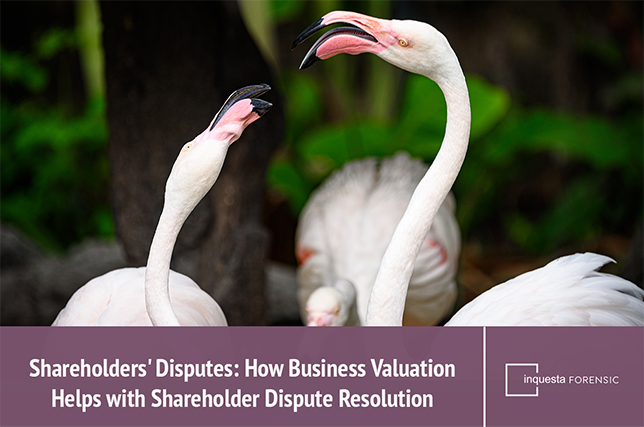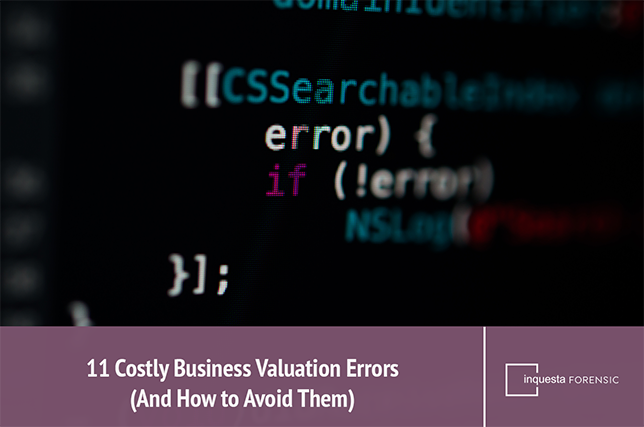The business valuation process can be an intimidating one, particularly for anybody unversed in its often complicated nature. From divorce to shareholder disputes, business valuations often go hand-in-hand with highly difficult and tense situations, meaning that a delicate yet accurate hand is needed.
To ensure that your business valuation process goes through as smoothly and effectively as possible, it is important that you find out more about what goes into it, why it is important, and what the most common methods are. This blog will cover all of that and more.
Why Value a Business
From providing clarity and assistance when dealing with issues like divorce and matrimonial disputes and shareholder disputes, planning for the potential growth of your company, as well as preparing for the future of the business with or without you (succession plans, sale, etc.). There are a variety of possible reasons as to why value a business.
When running a business, you have to work incredibly hard to build your profile, your reputation, your name-value, etc. If you’re putting in such hard work, it’s important to know its worth and get consistent value updates in the same way you might want to get consistent health or dental updates.
Divorce and Matrimonial Disputes
Something we are all aware of is that when a marriage ends, it is common that unless a prenuptial agreement is in place, assets will be divided. However, something many people may not be totally aware of is that not only will a company be included in divorce proceedings but it will likely be one of the highest value assets in the process.
Should either or both parties be business owners during a divorce or matrimonial dispute it is important that a business valuation is conducted to ensure that every single asset is distributed as evenly as possible. This is because it is unfortunately common for one party in a dispute to attempt to either undervalue or even hide particularly valuable assets or assets that they have a close personal attachment to.

Valuing a business that one side of a dispute controls can make an already complicated situation that bit more difficult. This is why it is highly recommended that when it comes to dealing with business valuation for divorce and matrimonial disputes, — arguably even more so than other causes for valuation — you should get in touch with an expert to ensure that transparency, accuracy, and efficiency prevails.
Growth Potential
Easily one of the most simple uses for a business valuation is to allow you to establish a clear baseline to allow you to plan for the future better and with more clarity. A regular valuation allows you a platform to make more informed business decisions, including setting goals, establishing a strategy, deciding on expansions, and hiring additional staff.
Essentially, regular business valuation will allow you the opportunity to become more informed on your company’s current position as well as its potential for growth and further investment in the future.
Plan for Future
Sometimes in business, change is inevitable. If a director is considering stepping down for any reason, be it retirement or seeking new opportunities, or is looking to sell for any reason, a business valuation will allow all parties to gain clarity on the company position and allow for clearer planning for when the change does occur.
A clear business valuation allows all parties to weigh up the angles before succession/sale. A business valuation facilitating a thorough strategy is especially important when it comes to retirement, particularly if the person returning has been a linchpin of the company in question for years.
The last thing a retiring director will want is for their lasting legacy to be tarnished thanks to poor planning.
Shareholder Disputes
A common cause of shareholder and commercial disputes will arise should one party wish to step away from the business. The actual cause of the dispute in such a circumstance will surround this departing shareholder seeking to receive the true value of their shares — something both sides are highly unlikely to agree on.

Other potential reasons for a shareholder dispute that a business valuation can help resolve includes:
- If a shareholder believes that the value of their dividend isn’t what it should be
- Shareholders believe that company directors are downplaying the value of their shares in order to short change them.
- Company directors are suspected of exaggerating the success of the company when struggling. This is done to afford them additional time to turn things around without the pressure from shareholders as they are unaware of the true health of their investment.
A useful tool, business valuations for shareholder disputes can allow for much greater clarity on the value of shares and the company as a whole. This is useful in helping to bring all manner of shareholder disputes to a fair and honest end.
How to Determine a Business Valuation
Working out how to determine a business valuation to best suit your situation is vital. Generally there are four common methods of valuing a company that will all look at different aspects of the firm, these are the asset, earnings, future earnings, and market value methodologies. These methods can be used individually or paired with each other for greater coverage.
The four simple methods of determining your business’ valuation are:
- Asset valuation: By focusing on the Fair Market Value (FMV) and Net Asset Value (NAV) of your company assets, you can see clearly what your firm is worth. The formula that goes with this method is company liabilities – sum of assets.
- Earnings Method: This method will look into a company’s past of earnings and profit. The hypothesis of the earnings method is that a company’s value should be linked to factors such as cash flow health and ability to pay bills on time.
- Market Value: By assessing the sale valuation of similarly sized companies in your industry, you should be able to get a good idea of what yours would be worth.
- Future Earnings Methodology: This valuation method assumes that a business’s value should be linked to its future earnings potential. Therefore, factors like company cash flow, rates of return, estimated future earnings should be considered.
For more information on the four most common business valuation methods, check out our blog which goes into significantly more detail.
Ultimately there is no one true answer for which method works best. Therefore it is highly recommended that you seek out the opinion of a qualified expert who can work with you to devise a clear strategy to best determine your value using your situation.
How Inquesta Can Help with the Business Valuation Process
The business valuation process can be difficult. However, it is incredibly important that it is done as accurately and efficiently as possible. There is not likely to be any room for error in the proceedings.
If you find yourself in the market, seeking to have your company valued for any reason, it is vital that you understand what the best method is for you. Inquesta have been assisting companies, shareholders, and directors with the business valuation process for decades. We have assisted firms of all shapes and sizes and of all manner of industries.
Our team of experienced and dedicated forensic accountants have seen it all, ensuring that they know exactly what it takes to guide you towards as useful a conclusion as possible. A badly done valuation which either under or over values your firm can set you on a path towards potential disaster so make sure you get it done right with Inquesta.
To find out more about what Inquesta can do to assist you in the business valuation process contact a member of our team today.
- Your Partner’s Been Convicted: Can They Take Your House? What Section 10a POCA Means For You
- The Essential Role of Forensic Accounting in High Net Worth Divorce
- How to Value a Startup Business: A Guide for UK Entrepreneurs
- Pig Butchering Scams: Guide to Crypto Romance Fraud
- Shareholders’ Disputes: How Business Valuation Helps with Shareholder Dispute Resolution








